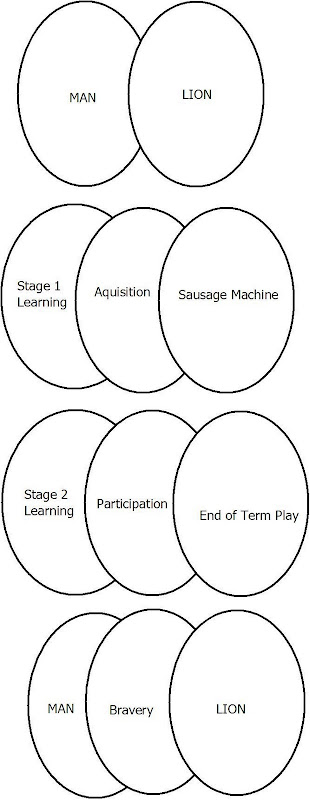It could be the subject of of PhD Thesis
Metaphor is the essence of learning, of knowledge transfer, of transmitting ideas, of ideas themselves, of innovation and creativity.
We labour it
Reading Sfard and various other authors/academics and philosophers ... and a neuroscientist I draw my own conclusions in relation to learning in general and e-learning in particular.
The first image is from Gareth Morgan. The explanation of how metaphor is used, and potentially abused (or simply confused) is clear. 'Man is a lion. He is a lion because he is brave.'
We permit poetic licence
We then move on to the idea of what I am calling (for want of a metaphor) Stage 1 Learning, that necessary first step where the person learning needs to acquire 'stuff,' where knowledge is imparted or experienced. This might be a lecture, a talk, a video, a book. Acquisition for me is not the metaphor, it is the description of what is occurring. I cannot see 'acquisition.' I can see someone at a supermarket check-out 'acquiring' goods, I can even visualise the 'sausage machine' concept/cartoon of information/knowledge being ground out of books and deposited in a person's head.
Moving on to Stage 2 Learning (though it could be any stage 2 through to infinity) we have a tool of learning, 'participation.' Here, once again, I understand an adjective describing actual participation, as demonstrated in the John Seely Brown lecture, of students working together at a table (round of course), with those on the 'periphery' taking part tangentially while those in the middle are the primary 'actors.' THIS is learning in the Congo Rain Forest to get honey from the top of a tree, this is learning above the Arctic Circle to cut blow-holes to harpoon seals ... this is how 'man' has always learned. a) where's the new thinking? b) is 'participation' a metaphor, or simple an adjective?
For me participation is the end of term play, the Christmas Panto, working on a student newspaper, blog or TV magazine show.
To use metaphor suggests improving communication of ideas and doing so in a persuasive and memorable way. There are cliched metaphors. They lose currency through over use. Educators appear to be stuck in a rut on this one, regurgitating old ideas.
